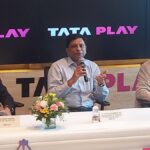The market share of Tata Sky has increased to 31.6% as of September 30, 2019, from 25% a year earlier. The company is a leader in terms of both revenue market share and subscriber market share in the DTH industry, according to CRISIL. The operator has seen high subscriber addition and increase in its Average Revenue per User (ARPU) which significantly improved the company’s business risk profile.
To reflect the steady improvement in Tata Sky’s business risk profile, CRISIL has revised its outlook on the long-term bank facilities and debt programmes from ‘Negative’ to ‘Stable’ and reaffirmed the ‘CRISIL AA’ rating. The rating on the short-term bank facilities has also been reaffirmed at ‘CRISIL A1+’. CRISIL has withdrawn its ratings on the company’s non-convertible debentures of Rs 400 crore on confirmation from the debenture trustee that they have been fully redeemed.
High subscriber addition and improvement in ARPU should result in a healthy operating profit growth of 15-20% in fiscal 2020. Tata Sky’s EBITDA margin over the medium term is likely to remain healthy. CRISIL said that though revenue may get impacted with the implementation of NTO 2.0, the operating profit of the company will remain intact, as the content cost is a pass-through for DTH players.
CRISIL said that the Novel Coronavirus pandemic should not have an impact on subscription revenue of TV distributors as television viewership has ramped up because of people staying at their homes. In addition to that, the pandemic has also led to an increase in the adoption of digital platforms by subscribers for recharge, which will save cost for the players and improve operating profitability in fiscal 2021.
“The ratings continue to reflect Tata Sky’s improved position and operating margin in the DTH business, healthy financial risk profile, and strong support from the parent, Tata Sons Ltd in case of any exigency. The strengths are partially offset by exposure to risks inherent in the DTH industry, such as the evolving regulatory landscape and viewership patterns, and project risks in the broadband segment,” CRISIL added in its report.
The entry of Tata Sky in the broadband segment exposed it to demand and implementation risks until the project stabilises. CRISIL had earlier expected Tata Sky’s net debt to increase because of planned sizable investments in the broadband arm, however, the company now plans to undertake the investment gradually, such that adjusted net debt to EBITDA ratio remains under 1.5 times.
Tata Sky’s financial risk profile has improved significantly over the past 5 fiscals because of reduction in debt (net of cash) and consistent increase in cash accrual. CRISIL expects Interest coverage and net cash accrual to adjusted debt ratio to improve to more than 8.5 times and 0.5 times, respectively, in fiscal 2020, from 3.3 times and 0.2 times, respectively, 5 years ago.
Tata Sky has strong liquidity, driven by healthy cash accrual over the medium term and cash and cash equivalent of Rs 550 crore as on March 31, 2020. According to CRISIL, internal accrual, cash and equivalent, and unutilised bank lines will be sufficient to meet debt obligation and working capital requirement over the medium term. The company has sufficient headroom to raise debt to meet CAPEX and investment requirement of subsidiaries.
Tata Sky commenced operations in 2004 as an 80:20 joint venture between Tata Sons and Network Digital Distribution Services FZ-LLC (NDDS). Its DTH operations commenced in August 2006. Currently, Tata Sons, NDDS, TSIL, Baytree, Omega, and Tata Capital Ltd are holding 41.49%, 20.0%, 20%, 10%, 7.8% and 0.71%, respectively, of Tata Sky’s equity share capital.








